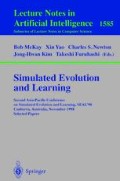Abstract
This paper describes investigations into using evolutionary search for quantitative spectroscopy. Given the spectrum (intensity × frequency) of a sample of material of interest, we would like to be able to infer the make-up of the material in terms of percentages by mass of its constituent compounds. The problem is usually tackled using regression methods. This approach can have various difficulties. We have cast the problem as an optimisation task. Using a hybrid of distributed genetic algorithm with a local search around the best individual of the population, very good results have been found, even with noise, for a number of different instances of the problem, with variations in the range between 6 and 16 constituent compounds. The stochastic optimisation approach shows great promise in overcoming many of the problems associated with the more standard regression techniques.
Access this chapter
Tax calculation will be finalised at checkout
Purchases are for personal use only
Preview
Unable to display preview. Download preview PDF.
References
J. J. Baraga. PhD thesis, Massachusetts Institute of Technology, 1992.
R. Collins and D. Jefferson. Selection in massively parallel genetic algorithms. In R. K. Belew and L. B. Booker, editors, Proceedings of the Fourth Intl. Conf. on Genetic Algorithms, ICGA-91, pages 249–256. Morgan Kaufmann, 1991.
Galactic Industries Corporation. http://www.galactic.com/galactic/Science/algo.htm. Web Site, 1996.
C. Kappler, T. Back, J. Heistermann, A.V. Velde, and M. Zamparelli. Refueling of a nuclear power plant: Comparison of a naive and a specialized mutation operator. In Proc. of PPSN IV, volume LNCS, 1141, pages 829–838. Springer, 1996.
J. Koza. Genetic Programming: On the programming of computers by means of natural selection. MIT Press, 1992.
E.H. Malinowski and D.G. Howery. Factor Analysis in Chemistry. John Wiley, 1980.
H. Mark. Analytical Chemistry, 58:2814, 1986.
W. Press, W. Vetterling, S. Teukolsky, and B. Flannery. Numerical recipes in C (2/e). CUP, 1992.
Author information
Authors and Affiliations
Editor information
Editors and Affiliations
Rights and permissions
Copyright information
© 1999 Springer-Verlag Berlin Heidelberg
About this paper
Cite this paper
Husbands, P., de Oliveira, P.P.B. (1999). An Evolutionary Approach in Quantitative Spectroscopy. In: McKay, B., Yao, X., Newton, C.S., Kim, JH., Furuhashi, T. (eds) Simulated Evolution and Learning. SEAL 1998. Lecture Notes in Computer Science(), vol 1585. Springer, Berlin, Heidelberg. https://doi.org/10.1007/3-540-48873-1_35
Download citation
DOI: https://doi.org/10.1007/3-540-48873-1_35
Published:
Publisher Name: Springer, Berlin, Heidelberg
Print ISBN: 978-3-540-65907-5
Online ISBN: 978-3-540-48873-6
eBook Packages: Springer Book Archive

